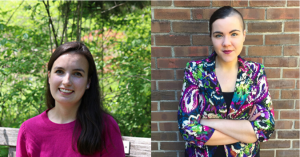By Hannah Montgomery, Graduate Writer
UNC’s Humanities for the Public Good Initiative has awarded the Humanities Professional Pathways Award to two ECL PhD students: Nora Augustine and Jane McGrail. The Humanities for the Public Good Initiative, started by Terry Rhodes, Dean of College of Arts & Sciences, with support from the Institute for the Arts & Humanities and funding from the Andrew W. Mellon Foundation, works to recognize and catalyze publicly engaged scholarly activity among humanists and humanistic social scientists at UNC-Chapel Hill. The goal of the Humanities Professional Pathways Award (HPP award) is “to support graduate students in building skills, relationships, and model projects which help them to define and integrate modes of social engagement into their overall agendas for doctoral study.” Each award provides $5,000 of funding for a summer research project within the setting of cultural institutions, selecting projects based on which will have “the highest potential for positive public impact.”
Jane McGrail plans to use her HPP award to design and implement “a weekly writing workshop series for high school students, hosted by an inner-city public library,” making university resources available to high school students “in order to facilitate their understanding of themselves as stakeholders in their own knowledge construction.” Using genre-based composition pedagogy and universal learning by design practices, this workshop series will “give students a space to learn to write a book review on a book of their choice.” These book reviews will then be compiled into a digital exhibit so that the students’ writing can be displayed on the library website and used by library patrons to select books to read.
McGrail’s goal for this project is “to increase access to pre-college learning experiences and to foster academic learning as an opportunity for students to further investigate topics in which they are already interested.” By removing traditional barriers to college experiences, “traditionally underserved high school student populations can access the kinds of critical thinking and learning opportunities that will help bolster their sense of preparedness for future academic work.” Through this workshop series, McGrail hopes to help high school students feel prepared for the future and invested in their education.
Building on her prior work in the Chapel Hill community, Nora Augustine designed a project to “expand and strengthen various reading- and writing-based resources” at The Compass Center for Women and Families—a violence prevention and services organization for survivors of domestic violence (DV) in Orange County. Augustine’s preparations for this project include her completion of support group facilitator training in summer 2016, facilitation of >100 hours of support groups throughout 2016–2020, and a trial run of similar programming in fall 2019 with support from the UNC Maynard Adams Fellowship for the Public Humanities.
Augustine’s project was initially designed with three key elements: writing new curricula for each of Compass’s themed support groups, visiting groups scheduled for summer 2020 to facilitate these activities, and building a library of reading materials for Compass’s clients. As Compass has temporarily suspended in-person support groups due to COVID-19, Augustine has switched gears, facilitating ad hoc Zoom workshops that draw heavily from writing activities Compass’s clients can complete at home with few materials. Still, “the concrete products of this project—nine reading/writing-based lesson plans and a virtual library of DV readings—will be generated as originally planned.” Augustine has also received funding to build a physical library of DV readings in Compass’s waiting room so that, when the center reopens, visitors can “peruse potentially illuminating books about DV within the safety and privacy of the center.”
Inspired by personal experience of DV, Augustine notes that “research on post-traumatic stress shows a strong correlation between book learning and psychological resilience; it is inferred that the cognitive and material resources afforded by higher education bolster one’s ability to cope with trauma.” Additionally, research on domestic violence “consistently identifies low education levels as both a major risk factor for DV and a rampant consequence of the same.” Through her project, Augustine is drawing on “substantial scholarly literature (and anecdotal evidence) that supports the therapeutic benefits of reading and discussing books in the course of healing from trauma.” Moreover, she is “responding to an observable demand among Compass’s clients, who often attest to the value of certain books in their personal processes of coping with abuse.”
In addition to completing her HPP project, Augustine has also been selected to serve as the Senior Fellow in this year’s HPP cohort. Recognized for her long history of civic engagement, Augustine will provide leadership for the fellows, fostering community and mediating between the fellows and the university.
Through these projects, McGrail and Augustine will be using humanities research and writing to bring about positive change in the community and resources for those in need.


